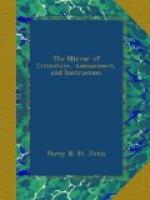April—. Lord Byron dined with us today. During dinner he was as usual gay, spoke in terms of the warmest commendation of Sir Walter Scott, not only as an author, but as a man, and dwelt with apparent delight on his novels, declaring that he had read and re-read them over and over again, and always with increased pleasure. He said that he quite equalled, nay, in his opinion, surpassed Cervantes. In talking of Sir Walter’s private character, goodness of heart, &c., Lord Byron became more animated than I had ever seen him; his colour changed from its general pallid tint to a more lively hue, and his eyes became humid: never had he appeared to such advantage, and it might easily be seen that every expression he uttered proceeded from his heart. Poor Byron!—for poor he is even with all his genius, rank, and wealth—had he lived more with men like Scott, whose openness of character and steady principle had convinced him that they were in earnest in their goodness, and not making believe, (as he always suspects good people to be,) his life might be different and happier! Byron is so acute an observer that nothing escapes him; all the shades of selfishness and vanity are exposed to his searching glance, and the misfortune is, (and a serious one it is to him,) that when he finds these, and alas! they are to be found on every side, they disgust and prevent his giving credit to the many good qualities that often accompany them. He declares he can sooner pardon crimes, because they proceed from the passions, than these minor vices, that spring from egotism and self-conceit. We had a long argument this evening on the subject, which ended, like most arguments, by leaving both of the same opinion as when it commenced. I endeavoured to prove that crimes were not only injurious to the perpetrators, but often ruinous to the innocent, and productive of misery to friends and relations, whereas selfishness and vanity carried with them their own punishment, the first depriving the person of all sympathy, and the second exposing him to ridicule which to the vain is a heavy punishment, but that their effects were not destructive to society as are crimes.




